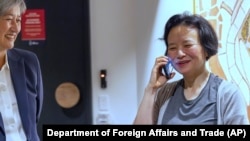An Australian Chinese journalist detained for over three years in China said Tuesday she was jailed for breaking an embargo by just a few minutes.
Cheng Lei, a former anchor at the Chinese state-run TV channel CGTN, was detained in Beijing in August 2020. A closed-door trial later took place in 2022.
But details of what led to that arrest had not previously been disclosed.
China’s Ministry of State Security said that a foreign organization approached Cheng in May 2020, and she provided them with state secrets. A police statement did not name the organization or say what the secrets were.
But in her first interview since being freed and returned to Melbourne, Australia, last week, the journalist told Sky News that Beijing arrested her for sharing a government briefing before she went on air, breaking an embargo by a few minutes.
“In China, that is a big sin,” Cheng, 48, said. “You have hurt the motherland. And the state authority has been eroded because of you.”
For years, analysts have pointed to Cheng’s plight as an example of the restrictive media environment in China. The country is one of the leading jailers of journalists and ranks behind only North Korea on the world press freedom index.
“What seems innocuous to us here — and it’s not limited to embargoes but many other things — are not in China,” said Cheng, explaining that issues that would not be as serious in Australia or the West are not handled the same way in China.
That the apparent reason for Cheng’s jailing was breaking an embargo “shows how ridiculous the whole thing is,” said Yaqiu Wang, the China research director at Freedom House.
Wang noted that the arrest came at a time when China-Australia relations were at a low, and Cheng’s arrest was Beijing’s attempt at sending a message.
“She was just an unlucky person being targeted,” Wang said.
Australian Prime Minister Anthony Albanese said Australia did not trade anything to secure Cheng’s release.
“Her return brings an end to a very difficult few years for Ms. Cheng and her family,” Albanese said in a statement. “The government has been seeking this for a long period of time and her return will be warmly welcomed not just by her family and friends but by all Australians.”
While still detained, Cheng detailed what her life in prison was like. In an open letter released in August, she described the harsh conditions and said she had little access to sunlight.
In response to VOA’s email requesting comment, Liu Pengyu, spokesperson of the Chinese Embassy in Washington, said Cheng’s rights “were fully protected.”
“China’s judicial authorities tried the case and delivered the sentence in accordance with the law,” Liu said.
Now back in Australia, Cheng has been reunited with her children and is adjusting.
“Sometimes, I feel like an invalid, like a newborn, and very fragile,” she told Sky News.
Freedom House's Wang said she believes Cheng’s case will have lasting consequences for the few remaining foreign correspondents in China. The nature of the charge is likely a warning from Beijing that no journalist is safe in China, according to Wang.
“That’s the message they want to send — anybody can be charged with anything, for any reason,” she said.






